CEJA backers claim record support as more than 1,000 lobby legislators online
Not the COVID-19 pandemic nor the cancellation of the General Assembly’s fall veto session could keep environmentalists from claiming a record turnout in what they called “the largest Clean Energy Lobby Day to date” on Thursday.
More than 1,000 people lobbied almost 100 legislators in various virtual venues online Thursday to push for passage of the Clean Energy Jobs Act.
While various groups lobbied legislators in small groups, the Illinois Clean Jobs Coalition held a midday Virtual Clean Energy Rally via Zoom with hundreds “in attendance” online and many more looking on via Facebook Live.
“It’s time for Gov. Pritzker and the pro-climate-action majority in the General Assembly to step up and lead on creating clean-energy jobs that puts equity at the center and holds utilities and fossil fuels accountable,” said Tonyisha Harris, Clean Energy Programs director at the Illinois Environmental Council. “Our communities need the benefits of CEJA right now — good-paying jobs, lower electricity bills, and public health improvements — and if we are to leave a livable planet for future generations we must take bold action on climate change immediately.”
“CEJA is built on a vision for a clean energy future with quality jobs and economic opportunity for communities that too often have been left behind — particularly Black and Brown communities and those that have been hit hardest in this pandemic,” said Rev. William Hall, pastor of St. James Community Church in Chicago. “Gov. Pritzker has stated that equity is a clean-energy priority of his, and CEJA is the only plan before the General Assembly that not only gets Illinois to 100 percent clean energy, but also ensures that 100 percent of Illinois shares in the benefits of clean energy.”
Michelle Knox, owner of WindSolarUSA in Springfield, said it would build on the 2016 Future Energy Jobs Act. Under that law’s funding for Solar Renewable Energy Credits, she said, “We saw solar growth skyrocket across Illinois.” Her own business saw gross sales rise from $400,000 in 2016 to $2 million last year, while more than doubling its employees from 11 to 23. But as funding ran out and the pandemic hit, she saw business drop 54 percent this year and cut back to 10 employees. Statewide, Knox added, 3,500 jobs had been lost in what she called a “solar funding eclipse.”
Knox charged that Pritzker “has yet to support any meaningful climate legislation,” adding, “We urgently need the passage of energy legislation to fix the solar funding eclipse.”
Pritzker has set forth eight principles for clean energy, but has not formally endorsed CEJA, although sponsors in the General Assembly feel they have the governor’s general support.
Chama St. Louis, of the Peoria People’s Project, said CEJA would “make Illinois clean, green, and more equitable.” She blamed her adult-onset asthma in part on “growing up in a disadvantaged neighborhood” in Peoria, prone to pollution, adding, “This piece of legislation is designed not only to make the environment safer …. but it also has been creatively crafted with racial equity in mind.” According to St. Louis, “CEJA will create thousands of living-wage jobs for our state,” specifically targeting minority communities that have borne the brunt of fossil-fuel pollution and its effects.
The Virtual Clean Energy Rally gets underway online. (Zoom)
The Virtual Clean Energy Rally gets underway online. (Zoom)
Eduardo Flores, of Clean Power Lake County, echoed that, saying his Waukegan community had “a painful history” of “industrial pollution and contamination.” He said CEJA would serve to “put an end to toxic pollution in our backyards and to hold fossil-fuel interests and utilities accountable.”
Mary Ellen DeClue, of Litchfield, said, “I live in central Illinois in an area surrounded by utility and coal damage. There wasn’t a just transition for us when fossil-fuel interests decided to pull up stakes and move on.” With coal-powered energy plants being closed across the state, if they haven’t closed already, she urged, “CEJA can’t wait,” given its provisions to hold utilities and fossil-fuel companies accountable for both the environmental and economic damage done to communities. She called for the state to “make coal pay” through CEJA’S “severance tax.”
“Coal-fired utilities have been fighting clean energy for decades,” DeClue added. “They have fought against coal-ash regulations, efficiency standards, (and) private installation of clean energy. … We deserve equity and a just transition from fossil fuel.”
According to the coalition, “In areas where coal-burning companies are shutting down without any support for workers or communities, CEJA provides property-tax replacement, job training, and empowerment zones to ensure a just transition for communities.”
Tylor Dove, a student at Southern Illinois University Edwardsville, said it would ultimately help address chronic flooding in Illinois and in his own Missouri hometown across the Mississippi River from Alton. “These continual floodings have economically crippled my hometown and many other people’s hometowns across the flood plains of the Midwest,” he added.
CEJA also sets goals to achieve a carbon-free energy grid by 2030 and 100 percent renewable energy by 2050.

